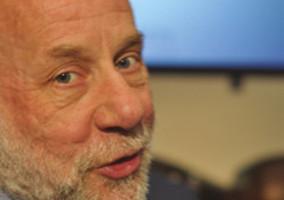Rhodri Davies from Charities Aid Foundation looks at what the role of new mayors could mean for encouraging philanthropy.
Last week I attended a voluntary sector hustings event for the Greater Manchester mayoral elections, organised by the Greater Manchester Council for Voluntary Organisations (GMCVO). Having moved up north only relatively recently, it seemed a great opportunity to find out what the challenges and issues at the forefront of the minds of those in the voluntary sector in the Manchester region actually are. And that was interesting. But perhaps just as interesting for me was what wasn’t discussed.
The majority of the discussion focussed on specific areas of social policy that are pertinent to the work of particular charities (e.g. homelessness, youth unemployment, equality), and on what the newly-elected mayor would do in terms of addressing those issues directly or supporting the voluntary sector to do so. There was also plenty of discussion of the challenges faced by charities with public service delivery contracts.
This included some interesting points from the candidates around whether the new mayor might have the power to effect a shift away from short-term contracts and back towards something more like longer-term grants for delivering services, and also acknowledgement from all candidates of the importance of involving the voluntary sector right from the start of the design process when it comes to public services, and not just right at the end when contracts are being procured. This echoed points from the recent NCVO report on devolution (Local Needs, Local Voices), which highlighted the fact that in many areas charities still have little or no opportunity to shape services, and have been notably absent from the conversation on overall devolution deals too.
What was missing, however, from both that NCVO report and the hustings event, was any real discussion of the importance of non-state funding for charities. There was virtually no mention of individual or corporate philanthropy. I think this represents a huge missed opportunity.
We were told time and again by each of the candidates that the exact powers of the new mayor are not yet certain; and that while they will have a reasonable degree of budgetary control and new spending powers, those powers will be limited and the mayor’s ability to shape policy will still be constrained by national policy decisions. However, the candidates agreed that the new mayoral role could wield a great deal of soft power. And I think this is right: for all that the Greater Manchester mayor’s actual power may be limited, their symbolic power could be enormous. As the elected figurehead of what now seems to be acknowledged (by most outside Birmingham) as the UK’s second city, the new mayor could have a major impact on cultural and social issues at a national level by demonstrating forward-thinking and innovative approaches to policy and practice.
Having a strategy for engaging with philanthropy could be one area where the new mayor (and indeed any of the six new directly elected mayors) could show real leadership. UK central government policy and strategy on philanthropy and charitable giving has been fairly difficult to determine for the decade or so that I have been working on it. There is little clarity on what government sees as the role of philanthropy, how best to support and encourage it, and how it can work effectively with public and private sector money to address key social challenges. But at a city region level, there is a real opportunity to find practical answers to these questions.
Newly-elected mayors shouldn’t design a philanthropy strategy just because it is a nice thing to do. Rather, they should do it because it makes clear political sense. The mayor of Greater Manchester will be faced with a known set of difficult social challenges on the one hand and, a large and vibrant pool of individuals and businesses who have money and want to support the area they live in on the other. Why on earth would a mayor not want to engage with them to see whether their wealth and enthusiasm can also be directed towards addressing those challenges? If the spending and policy power of elected mayors is limited and constrained, but their soft power is significant, then an effective way to use that soft power would be to encourage and co-ordinate locally-focused philanthropy to leverage far greater resources and take advantage of the greater flexibility that philanthropists have to operate outside the strictures of central government policy.
In the North of England, this argument seems particularly compelling. Philanthropy played a hugely important role in the economic and social prosperity of many great Northern cities and towns in the past, so why couldn’t a new vision of 21st century philanthropy be a key part of their future? Many Northern cities struggled to adapt to the decline of traditional industry in the UK after WWII, and found themselves on the ropes. Some have managed to reverse that decline and have begun to reinvent themselves as thriving economic and cultural hubs for the 21st century, as visitors to Manchester, Liverpool or Sheffield can testify. Other towns, meanwhile, are still struggling to adapt.
Devolution and the introduction of directly-elected mayors will bring real opportunities for many of them. I believe that one of these opportunities is to act as a focal point for reinvigorating a culture of civic philanthropy that can help to develop economic, social and cultural prosperity, and play a part in strengthening towns and cities in the North of England to take on the challenges and opportunities of the future.
We will be exploring the role that philanthropy can play in civic renewal in a new CAF project called Giving for the City. This will look further at the specific context in the North of England, but also at the wider UK and internationally. Anyone interested in finding out more or feeding into the project can contact Rhodri Davies at [email protected].
Related articles












